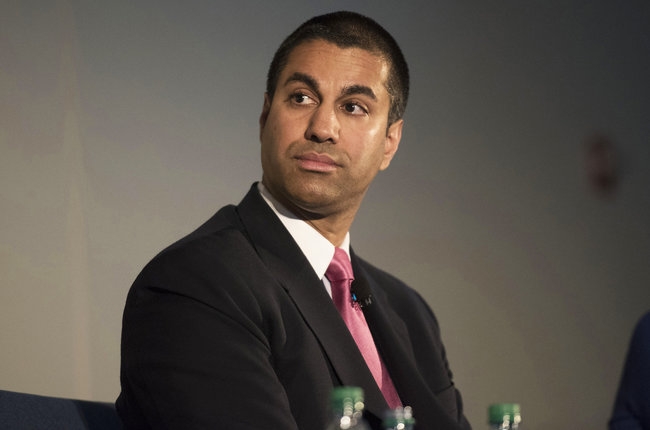On the campaign trail, Donald Trump said mergers like the AT&T and Time Warner deal meant "too much concentration of power in the hands of too few." Recently, the new president expressed a similar sentiment. "You have to have competition in the marketplace and you have to have competition among the media,” he told a Breitbart reporter.
But thanks to a hands-off attitude by the FCC and its new chair, Ajit Pai, there may never be a better time for media consolidation.
It's not just that the FCC under the new chairmanship of Pai isn't forcefully pushing to review the AT&T-Time Warner merger, although that's part of it. At a Senate committee oversight hearing, Pai said he didn't believe the FCC had “jurisdiction” to review the $105 billion deal given Time Warner's calculated decision to sell its only TV station, Atlanta's WPCH, to Meredith. Such might be true, with the Justice Department getting the sole crack at reviewing AT&T-Time Warner. (The DOJ has never blocked a vertical marriage between a supplier and distributor and won't consider the proposed deal from a public interest standpoint.)
But a more aggressive regulator might be looking to Time Warner's more obscure government licenses including for CNN satellites to force AT&T to submit its merger, or technically speaking, apply for license transfers. Even if Pai's FCC were willing to go to that far -- and Hap Rigby, senior policy advisor at Wiley Reins says, “This FCC probably wouldn't use run-of-the-mill licenses like satellite uplinks or headsets to extract a mountain of concessions” -- the independent agency is nevertheless settling into a posture that will likely incentivize more mergers.
Consider what's happening with net neutrality. The FCC's 2015 decision to reclassify broadband as a "utility" under Title II of the Telecommunications Act ushered in the possibility that the internet would be as heavily regulated as airlines, waterways and phone lines. Title II regulation is something Pai has signaled he intends to walk back. At a recent speech in Barcelona, Pai called it a "mistake" and spoke about "returning to the light-touch approach to regulation that produced tremendous investment and innovation throughout our entire internet ecosystem."
Pai may publicly support the proposition that internet service providers shouldn't charge the likes of Netflix and Amazon for high-speed lanes, but he detests anything that smacks of rate regulation, a possibility under Title II even though the FCC explicitly drew the line there via a process known as "forbearance." The net neutrality rules include bans on ISPs blocking or throttling traffic or engaging in paid prioritization of traffic, but complication has ensued. In 2016, the FCC began an investigation into whether so-called "zero-rating" services -- whereby a broadband or wireless distributor like AT&T or Verizon excludes the consumption of its owned content from consumers' data caps -- violates the spirit of paid prioritization. One of Pai's first moves after being promoted by Trump was to shut down that probe. So if AT&T is allowed to buy Time Warner, its subscribers could stream a Warner Bros. film without impact on their data cap.
"In the days following our decision, all four national wireless providers in the United States announced new unlimited data plans or expanded their existing ones," Pai crowed in Barcelona. "Going forward, the FCC will not focus on denying Americans free data."
Of course, what's "free" is in the eyes of the beholder. In a sense, AT&T's non-owned content gets charged extra. And critics worry this will permit media giants to favor their own content to the disadvantage of others. In a February letter to Pai, Sen. Al Franken wrote, "Because of net neutrality, a handful of multibillion-dollar companies cannot control where their users get their information, and those massive corporations cannot choose to bury sites offering alternative viewpoints."
The allowance of zero-rating services could give AT&T's competitors, especially Verizon, an incentive to acquire content studios of their own to entice customers with "free" data. Suddenly, owning content is more meaningful than ever for those who control the pipelines. That's not the only reason observers expect increased dealmaking in the media space.
The FCC also may be primed to relax the rules barring the cross-ownership of a newspaper and broadcast station in the same market. Those rules already are being tested. For example, on Feb. 28, Fox asked the FCC for a new waiver allowing combined ownership of New York and New Jersey stations along with the New York Post, citing the positions of the FCC's new leadership. The agency is also reported to be introducing a proposal as soon as today that would effectively loosen a cap on audience share for television station owners. Plus, full foreign ownership of American broadcast units is now on the table after the FCC on Feb. 23 approved the application from an Australian couple who wished to take over licenses of radio stations in Alaska, Arkansas and Texas. Might Japan's Sony Corp. become more heavily involved in the American broadcast business?
If global media consolidation does not sound like a development that Trump's supporters expected, well, as broadcast attorney Barry Skidelsky puts it, "There's hypocrisy in government — shocking."








